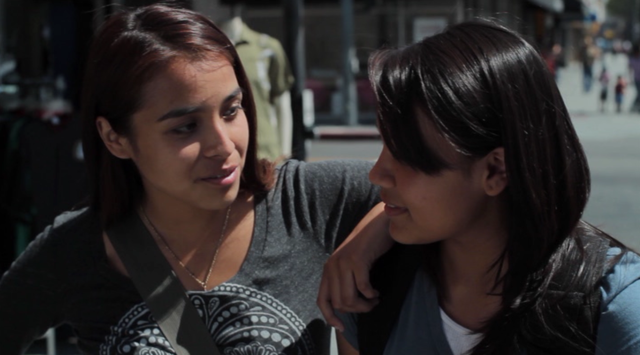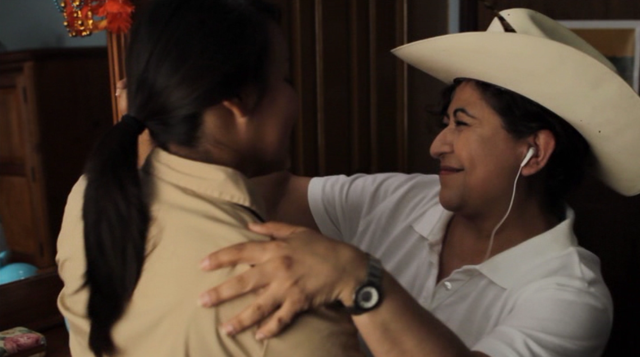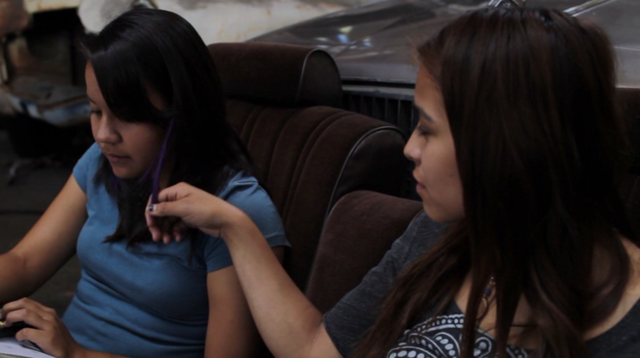NOTE: This is the first in a series of advance reviews the Long Beach Post will be doing of the films featured and highlighted in this year’s QFilms Festival. The festival will make its appearance on September 14, 15, and 16 at the Art Theatre.

Mari (Venecia Troncoso, left) and Yolanda (Fenessa Pineda, right) explore teenage life.
In her auspicious debut, writer and director Aurora Guerrero examines a plethora of subjects up close in Mosquita y Mari: poverty, heritage, sexual identity, escaping marginalization, education, and youth Chicano culture. Her consistent use of close-ups and a lack of steady cam shots—though sometimes beautiful—to emphasize the lack of balance in such pressing issues can be overbearing. However, in all, she handles the array of issues with a strange ease in this sleepy, patient tale of two girls exploring and discovering one another.
Yolanda, played by Fenessa Pineda with a gorgeous sense of determination and frustration, is a success story: at the top of her class, removed from the majority of her otherwise misaligned classmates, and submerged between her love of American and Mexican culture. Her family, though not excessively affluent, is comfortable in their Huntington Park existence.
Mari, Yolanda’s new next door neighbor and evocative carried out by Venecia Troncoso, is quite the opposite though not necessarily by choice. She lives, along with her younger sibling and mother, in a struggling household that fails to make rent. Her fight for money to contribute to her family is equal to her fight to escape that exact problem.
Yolanda’s fascination with Mari is not initially reciprocated, Yolanda’s smile at helping Mari catch up in geometry being returned with a harsh, “What?” Yolanda’s reference to being her neighbor is returned with more vitriol: “And? Do I owe you something?” With a disgusted look and an up-down with her eyes analyzing Yolanda, she quips, “You look like a little fly — pinche mosquita.”
What becomes most interesting are the two character’s liminal states of being. Both share the strange place of being simultaneously American and Latina, having grown up in the States but surrounded by the Latin American culture that is largely Huntington Park. None of the adults in the film speak English outside of their teachers, relegating each teenager to quip in bits of Spanglish when arguing or frustrated with their parents.
And these frustrations are not just linguistic or cultural. The privileges—even within communities that already lack privilege—that divide Mari and Yolanda become glaringly obvious: the sexual and educational hardships of Yolanda are “up here” for Mari, lacking a survival basis surrounding needs such as rent and food. However, Yolanda holds the exact opposite view, for survival is exactly what she’s fighting for as well: surviving her parents’ lackadaisical view that stellar grades are not a part of hard work but a given, surviving her torn perspective of both loving her culture and wanting to escape, and, of course, surviving Mari.
Putting on her father’s cowboy hat and slipping on her headphones to listen to a CD of Mari’s, Yolanda discovers she is in love, entirely subsumed in Mari—the person whom her entire culture forbids her from intimately interacting. Perhaps, if she could wear a hat, she could sweep Mari off her feet.

Mrs. Olveros (Laura Patalano, right) dances with Yolanda.
Yolanda’s mother, played with a stern fierceness by Laura Patalano, is, as every Latina mother is, perceptive of her daughter’s torn identity and, even when walking in upon her daughter sporting her father’s hat, her support is always questionable. Mrs. Olveros initially takes the hat, putting it on and asking her daughter if she would like to dance. But a single glance in the mirror told her the future: this was most likely going to be her daughter, two women dancing together as her and her husband did, driving home her own divide between the love of her child and the love of her Mexican tradition, rooted in Catholicism.
It is clear the double meaning of the title. We have an offensive term-cum-pet name that gives the title its literal meaning, but we also have Mari—a Spanish term that both refers to a shortening of Maria and water, and the play of water and mosquitoes attracting each other during times of immense heat becomes a metaphorical driving point.

And like all flying creatures, we are unsure of where Yolanda will fly to survive next and, much like water, we are equally unsure if Mari will flow or stay stagnate—reflective of the intensity and confusion and beauty of teenage relationships. We are unsure of their fate and unsure of the length of their existence and pretty much unsure of anything outside of the emotions railing against and through our bodies during the pivotal moments of experiencing that intensity directly. While Guerrero leaves us in this state of unsureness—again, reflective of that in-between state she emphasizes throughout the film—we are at least sure that Yolanda and Mari learned the trials and beauty of love in that strange space of time we call adolescence.
****
The 2012 QFilms Festival will occur September 14, 15, and 16. Mosquita y Mari will be shown on Saturday, September 15 at 7:30 at the Art Theatre, located at 2025 E. 4th Street.
For more information about the festival, visit www.qfilmslongbeach.com. Passes and tickets are available through the link provided. Submissions for this year’s festival are closed but 2013 submissions will be accepted beginning October 15 via www.withoutabox.com.

